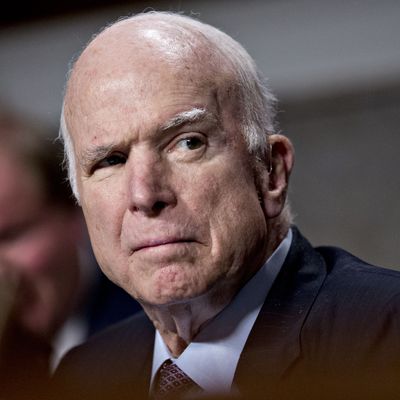
Senator John McCain, the iconic Republican senator, two-time presidential candidate, decorated Naval bomber pilot, and former prisoner of war in Vietnam, died at his Cornville, Arizona, home surrounded by his family late Saturday afternoon after a battle with brain cancer. He was 81, and is survived by his wife Cindy and seven children, including The View co-host Meghan McCain. His family had announced on Friday that he would discontinue his medical treatment.
His body will soon lie in state at both the Arizona Capitol and the U.S. Capitol Rotunda, and a full dress funeral will be held for him at Washington National Cathedral before he is buried in Annapolis, Maryland. McCain will be only the 13th U.S. senator to receive the honor of lying in state at the U.S. Capitol.
McCain, the son and grandson of four-star U.S. Navy admirals, was born at a Naval airbase in the Panama Canal Zone in 1936. He eventually followed his family line into the military and became a Naval aviator after graduating from the U.S. Naval Academy. He later went on to fly combat missions during the Vietnam War, where he earned two medals before being shot down and captured in 1967. McCain spent the next five and a half years in North Vietnamese prison camps, where he endured severe torture, routine beatings, long-term solitary confinement, and dysentery. He was at first denied medical care despite receiving multiple injuries from his crash and at the hands of his initial captors (who stabbed him and crushed his shoulder with a rifle butt). McCain somehow survived his brutal first several months as a P.O.W. and was offered repatriation in 1968, on account of his famous father, but refused to leave unless every other American prisoner captured before him was freed first. While his treatment eventually improved, he was not released until 1973, and his wartime injuries left him disabled and unable to lift his arms above his shoulders for the rest of his life.
Back in the U.S., McCain eventually decided to leave the Navy in 1981, but not before getting a taste of politics as the Navy’s Senate liaison. Believing he could accomplish more as a member of Congress, the celebrity war hero and new Arizona resident was elected to the House in 1982, serving two terms before successfully running for the Senate. McCain would go on to serve the remaining years of his life as a senator and develop a reputation as a conservative “maverick” on account of his tendency to challenge other Republicans and conservatives, as well as his personal stands on issues like immigration reform, bipartisan cooperation, and most famously, campaign finance reform. The most important legislative accomplishment of McCain’s career was the campaign finance reform bill he co-authored with Democrat Russ Feingold. It was eventually signed into law as the Bipartisan Campaign Reform Act in 2002.
McCain served on the Senate Armed Services Committee during his entire tenure in the Senate, and was made its chairman in 1997. He was an ardent supporter and occasional critic of the military across his career. He also earned a sometimes notorious reputation as a hawk on foreign policy, particularly in relation to American adversaries like Russia and Iran — which he once joked about bombing to the tune of a Beach Boys song. McCain supported, and sometimes advocated for, most U.S. wars and military interventions, including the disastrous Iraq War, which he continued to back even after it became widely seen as a failure.
McCain also proudly worked to restore diplomatic relations between the U.S. and Vietnam, and the two countries are now allies as a result. He ended up publicly forgiving his captors, then making several trips to the country after the reconciliation.
While the majority of his voting record in Congress reflected his conservatism, he did periodically vote against his party across a range of issues for a variety of reasons. Central to the “maverick” label, which McCain clearly relished, was the way in which seemed to make up his own mind on most political matters, even as heterodoxy became less and less acceptable on the post-Fox News (and post-Palin) American right. (Critics of McCain, on the other hand, argue that his views were more motivated by politics and self interest than his reputation suggested.) McCain was also widely liked and respected by many of the political journalists who covered him, which has led to occasionally outsized coverage of his ups and downs over the past few decades.
McCain ran for president in 2000, riding his infamous “Straight Talk Express” bus on the campaign trail and going up against GOP establishment candidate George W. Bush, who ultimately defeated him after a memorably vicious campaign. McCain ran again in 2008, winning the Republican nomination this time and fatefully selecting Alaska governor and subsequent right-wing mascot Sarah Palin as his running mate. He lost the general election to Barack Obama and returned to the Senate.
Last summer, amid his sixth consecutive Senate term, McCain was diagnosed with an aggressive brain tumor after undergoing surgery to remove a blood clot over his eye. Just weeks later, the unhealed surgery scar still visible on the side of his face, he returned to the Senate and dramatically cast the decisive vote killing the GOP’s last-ditch effort to repeal Obamacare.
McCain had also been one of the only GOP lawmakers to consistently stand up to President Trump, earning regular retaliation from the president, who went so far as to challenge McCain’s status as a war hero and criticize him for allowing himself to be shot down and captured. Trump, who found a way to avoid the draft during the Vietnam War, pointedly neglected to mention McCain’s name a few weeks ago while holding a signing ceremony for a military spending bill which was named after the senator as a tribute from his fellow lawmakers. McCain has also been one of the fiercest critics of the president’s unfounded skepticism about whether Russia interfered in the 2016 election, as well as his apparent admiration for Russian president Vladimir Putin.
Though he is not known for his expressions or understanding of empathy, Trump offered his sympathies to McCain’s family in a tweet on Saturday, but said nothing about McCain himself.
McCain told several people before he died that he did not want President Trump to be invited to his funeral. Presidents Obama and George W. Bush, were reportedly asked to deliver eulogies. The drama of McCain’s request — or more importantly, Trump’s potential reaction to it — means that McCain’s criticism of the president will probably live on and become amplified as the senator’s death dominates the news. In that way, McCain will be able to run the news cycle, and annoy a U.S. president, one final time from the grave.
He’ll also annoy Democrats in death. His now-vacant Senate seat will be filled by whomever Arizona’s Republican governor, Doug Dacey, chooses to appoint for the remainder of McCain’s term. Had McCain resigned before June, the seat would have been filled via a special election this fall, but his decision to hold on to his seat has allowed the GOP to hold on to it too.
This post has been updated throughout.































